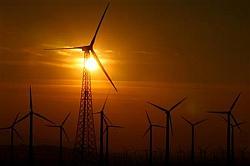India plans to double its renewable energy capacity to 55,000 MW by 2017 as part of efforts to increase efficiency of its energy use, Prime Minister Manmohan Singh said in New Delhi on Wednesday.
 "It is proposed to double the renewable energy capacity in our country from 25000 MW in 2012 to 55000 MW by the year 2017," he said inaugurating the Fourth Clean Energy Ministerial conference.
"It is proposed to double the renewable energy capacity in our country from 25000 MW in 2012 to 55000 MW by the year 2017," he said inaugurating the Fourth Clean Energy Ministerial conference.
He said this would include exploiting non-conventional energy sources such as solar, wind power and energy from biomass.
Singh said India's 12th Five Year Plan recognised the importance of evolving a low carbon strategy for inclusive and sustainable growth.
"We have set ourselves a national target of increasing the efficiency of energy use to bring about a 20 to 25 per cent reduction in the energy intensity of our GDP by 2020,"
he said, adding that the Plan envisaged an expanded role for clean energy, including hydel, solar and wind power.
However, he said the pace of expansion of reliance on new energy sources was constrained by the fact that these were more expensive than conventional energy.
"The cost of solar energy for example has nearly halved over the last two years, though it remains higher than the cost of fossil fuel based electricity. If the cost imposed by carbon emissions is taken into account, then solar energy is more cost effective, but it is still more expensive," he said.
Counting on the probability of falling costs in this area, Singh said India has launched a Jawaharlal Nehru National Solar Mission to develop 22,000 MW of solar capacity by the 2022 covering both solar photovoltaic and solar thermal.
"The cost differential is being covered by different forms of subsidy and cross subsidy, he said.
© Copyright 2025 PTI. All rights reserved. Republication or redistribution of PTI content, including by framing or similar means, is expressly prohibited without the prior written consent.

 "It is proposed to double the renewable energy capacity in our country from 25000 MW in 2012 to 55000 MW by the year 2017," he said inaugurating the Fourth Clean Energy Ministerial conference.
"It is proposed to double the renewable energy capacity in our country from 25000 MW in 2012 to 55000 MW by the year 2017," he said inaugurating the Fourth Clean Energy Ministerial conference.